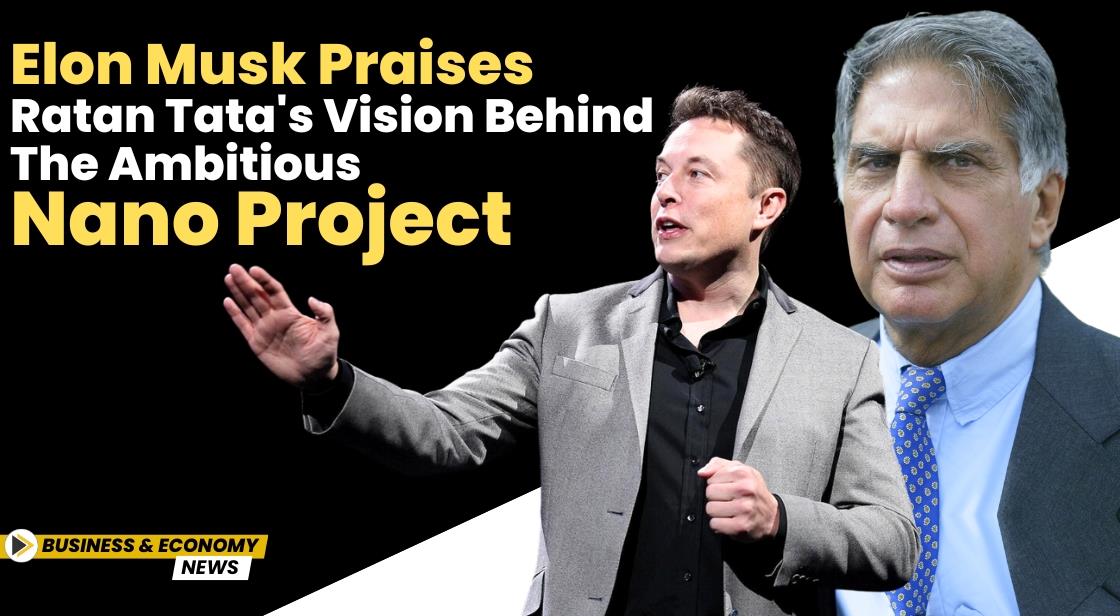Elon Musk Praises Ratan Tata's Vision Behind the Ambitious Nano Project

News Synopsis
Ratan Tata, a revered Indian industrialist and former chairman of Tata Sons, recently passed away due to age-related issues. His passing marks the end of an era in Indian industry, but his legacy of innovation and compassion continues to inspire. One of his most ambitious endeavors, the Tata Nano project, has come back into focus after a 2009 interview with Tesla CEO Elon Musk resurfaced, highlighting Tata’s contributions to the automotive sector.
The Vision Behind the Tata Nano
In 2009, Ratan Tata launched the Tata Nano, which was widely dubbed the "people’s car." Priced at just ₹1 lakh (approximately $2,300), the Nano was designed to revolutionize car ownership for India’s burgeoning middle class. Tata envisioned a safer, more affordable alternative to the two-wheelers that filled Indian roads. His goal was not just to make a car but to create an accessible means of transportation for millions of people. This mission represented a bold innovation at a time when car ownership was still a distant dream for many Indian households.
The Tata Nano was more than just a business venture; it was a reflection of Tata’s deep-rooted compassion and understanding of the needs of everyday Indians. The car was designed to address the safety concerns associated with two-wheeler travel, offering families a more secure way to commute. Ratan Tata’s ambition to serve the masses rather than the elite made the Nano project a socially significant initiative, even though it eventually struggled in the market.
Elon Musk’s Insights on Tata’s Ambitious Project
In a 2009 interview with television host Charlie Rose, Elon Musk, the CEO of Tesla, shared his thoughts on Ratan Tata's vision. Musk, known for his pioneering work in electric vehicles and space exploration, acknowledged the potential impact of Tata’s Nano project. He commended Tata for aiming to democratize car ownership, stating that "it’s a good idea to have affordable cars." Musk described Tata as a "gentleman and scholar," reflecting the respect he held for Tata's innovative spirit and commitment to addressing societal challenges.
Musk’s admiration for Tata was evident as he praised the Nano’s core concept of affordability. He recognized the significance of creating a car that could serve India’s growing middle class, which was largely underserved by the existing automotive market. Tata’s determination to push boundaries and innovate in an industry dominated by fierce competition impressed Musk, especially considering the high barriers to entry in the automotive sector.
Musk's Prediction of the Challenges Ahead
Despite his admiration for the Nano’s vision, Elon Musk also foresaw some of the challenges the project might encounter. In his interview, Musk highlighted a crucial issue that could impact the car's long-term success: the cost of running the vehicle. While the Nano’s low purchase price was its primary selling point, Musk pointed out that rising fuel costs and other operational expenses could pose significant hurdles. "The cost of acquiring the car is much less of an issue than the cost of running the car," Musk noted, offering a perspective that later aligned with some of the struggles the Nano would face.
Musk’s foresight was prophetic in many ways. As fuel prices in India continued to rise, the affordability of running the Nano became a growing concern. Additionally, the car's minimalistic design and lack of features, which were intended to keep costs down, began to work against its appeal. For many consumers, the Nano was seen as a "cheap" car rather than an affordable one, which negatively affected its brand image.
The Challenges and Legacy of the Tata Nano
The Tata Nano, despite its groundbreaking vision, encountered a number of obstacles that ultimately led to its discontinuation in 2018. One of the key challenges was the perception of the car as a symbol of economic status. In India, where car ownership is often associated with upward mobility, the Nano’s reputation as an inexpensive car deterred many potential buyers. Instead of being viewed as a practical, affordable solution, it was perceived by some as a "poor man’s car," which hurt its marketability.
Additionally, rising fuel costs, which Musk had predicted, made the cost of ownership less appealing. Safety concerns also emerged as a major issue. Though Tata designed the car with the intention of offering a safer alternative to two-wheelers, the Nano was criticized for lacking advanced safety features, further diminishing its appeal to more safety-conscious consumers.
Despite these challenges, the Nano remains an iconic part of Ratan Tata’s legacy. It was a bold attempt to bridge the gap between affordability and innovation in the automotive industry, and while it may not have achieved the revolutionary success that Tata had hoped for, it symbolized his forward-thinking approach. The Nano project demonstrated Tata’s commitment to improving the lives of everyday people by offering solutions tailored to their needs.
Conclusion: The Enduring Influence of Ratan Tata's Vision
Ratan Tata's contributions to the automotive industry, particularly through the Tata Nano project, continue to resonate even after his passing. His ability to combine compassion with innovation set him apart as a visionary leader who always had the welfare of the common person in mind. The Nano may not have achieved the mass-market success it was designed for, but it will always stand as a testament to Tata’s desire to challenge norms and push the boundaries of what was possible.
The resurfacing of Elon Musk’s 2009 interview serves as a reminder of Tata’s enduring impact on the global automotive landscape. Musk’s praise for Tata reflects the universal respect that he commanded as both a business leader and a humanitarian. Though the Nano faced challenges that it could not overcome, its legacy endures as part of Ratan Tata’s broader efforts to innovate and uplift society.
You May Like









